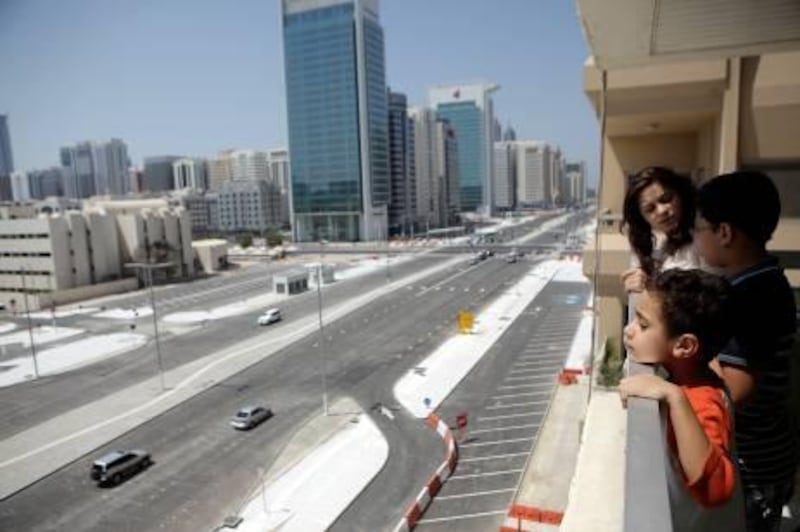ABU DHABI // After enduring four years of construction and congestion, inner city residents and business owners breathed a sigh of relief as the capital's biggest road infrastructure project opened another key section.
Two kilometres of Salam Street from Hamdan Street to Al Falah Street opened at 5am on Friday. As traffic flowed smoothly down the street, residents rejoiced as the construction dust finally settled in their area. Restaurants, open for business, braced themselves for an influx of customers, while taxi drivers revelled in the street's new stretch.
"So far, so good. We've had no problems," Mohammed Shoqfa, the municipality's senior project manager, said. "We have 24/7 emergency teams on standby monitoring the street in case of any unexpected connection failure with the signals or if anything else goes wrong."
The Dh5 billion venture started in October 2007 and has been delayed twice. The anticipated date of completion was October 2010, then this July, and now work is expected to wrap up early next year.
"It's fantastic," said Bharat Naik, an Indian resident of the Darwish Building on Salam Street. "It's much better than what we endured."
Mr Naik and his wife have been living on Salam Street for six years. More than half of their time there has been marked by drilling noise, dust from construction sites, and a maze of traffic barriers and diversions.
"I used to come all the way round through the Navy Gate entrance to get home," Mr Naik said. "But we will definitely enjoy walking more now."
For Ahmed and Amjad Osman, an Egyptian couple living in the Qubaisi Building for seven years, 2007 was the worst year. They said they were "thrilled" about the opening.
"We really suffered a lot because of the dust from construction sites," said Ms Osman, an assistant teacher at the Al Yasmina school in Khalifa City A.
Every week or two, they would find new shortcuts to reach their destination, only to find them closed shortly after.
"It was so hard to be on time for work," she said "It usually takes me 45 minutes to get to work, but I presume it will only take me half the time now."
The couple also experienced a lack of visits from friends because "no taxis would accept to drive them to the street".
On Friday, many parking spots were free on the first day of the street's opening as 700 spaces opened up - a miracle for most Abu Dhabi residents.
But Mr Osman said his wife and he were concerned that parking charges would eventually be applied to the area. The couple own two cars and park for free.
The area's businesses are also hoping to thrive after a dry patch during the past few years.
"Business dropped a lot in 2008 because of the hectic traffic situation," said Praveen KK, the manager of the India Palace restaurant, which has been operating for 15 years.
"We lost 50 per cent of our customers because we were in this mess. Customers would only order delivery so it made a big difference to us."
Mr KK is expecting his old customers to return and a 50 per cent increase in his clientele. He said already a good number of residents had called to book a table.
Even taxi drivers expressed their delight at the smooth flowing traffic.
Tikprasad Gautam, a Nepalese driver, has been driving in the capital for two years and a half. He had never witnessed the street before construction began and he started his shift yesterday two hours after it opened. "I'm excited it's open because I have to learn all these new roads," he said. "I can tell already the traffic is much better now."
Previously, Mr Gautam would avoid driving customers to the street, dropping them off nearby as it was "very hard and tiring to drive around the area".
"I once took a customer from Al Wahda Mall to Abu Dhabi Mall and it took me 30 minutes," he said. "I believe now it will probably be a seven-minute trip for Dh10."
Many motorists were cognisant, however, that the newly opened section would not be properly tested until rush hour on Sunday.
As for pedestrians, the new state-of-the-art traffic lights seemed to have pleased a few. "I waited only 10 seconds to cross the road," said Hassan Sharq, a Syrian resident. "I hope they change all of Abu Dhabi's pedestrian lights because this is really efficient."
The signals use a technology that reduces power consumption and maintenance.
As the third of four stages was fully functional on Friday, another 1.6 kilometres of road is still under construction. The municipality expects about 126,000 vehicles to use the road each weekday.






